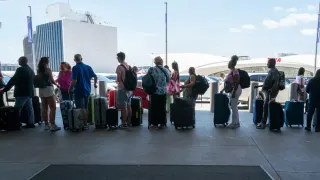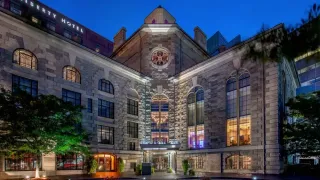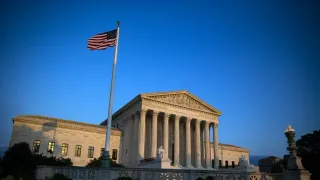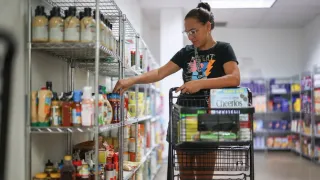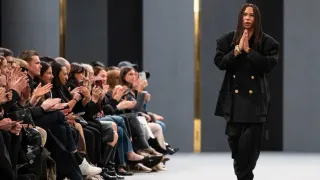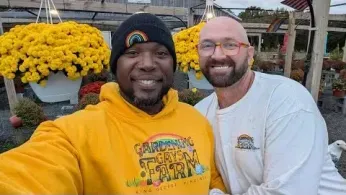
3 hours ago
Gardening Gays' Virginia Farm Targeted in Hate-Fueled Vandalism: A Community Stands Firm
READ TIME: 5 MIN.
There's a particular kind of joy that comes from building something openly queer in a place where you're not supposed to exist. Kevin Graham and Dragan Kurbalija had discovered that joy on their 27-acre farm in King George, Virginia—until November 5, 2025, when someone decided to remind them that visibility still comes with a price.
On what should have been just another autumn evening at Gardening Gays Farm, the couple discovered their entrance had been deliberately defaced with medical waste and human feces. The message was unmistakable, even if the perpetrators weren't: you don't belong here.
"It does not appear to be an accident," Kevin told The Advocate, his matter-of-fact tone belying the violation."You look up and down the roadway, and everywhere else is completely clear. The trash is only at our entrance."
The specificity of the targeting—the deliberate concentration of waste at their farm entrance while the surrounding roadway remained untouched—speaks to something darker than random vandalism. This was a message. This was meant to hurt. And yet, in the days following the incident, what emerged from the Gardening Gays' response was something far more powerful than the hate directed at them: a quiet, unapologetic refusal to disappear.
To understand why this vandalism matters, you need to understand what Kevin and Dragan have actually built. Their story isn't a tragedy narrative wrapped in respectability politics. It's something more interesting: a genuine success story rooted in authenticity, hard work, and an almost radical commitment to being exactly who they are.
Kevin grew up gardening alongside his father in the landscape business before pivoting to journalism—a career he maintains to this day. Dragan grew up on a farm in Croatia, bringing with him decades of agricultural knowledge and a deep understanding of what it means to build from the soil up. When the couple met, they began gardening around their townhouse near Washington, D.C., where they jokingly called themselves the"gardening gays" of their neighborhood.
But a townhouse garden, no matter how lush, has limits. When COVID-19 hit and grocery store shelves emptied, the couple made a bold decision: they would pursue food sovereignty. In the fall of 2021, they purchased their 27-acre farm in King George County and began building something from scratch.
What they've created is genuinely impressive. The farm now produces cut flowers, vegetables, eggs from over 300 chickens, duck meat and eggs from 75 ducks, and wool from their sheep population. They've planted 350 fruit trees that will begin producing next season. Rather than competing at farmers' markets dominated by industrial producers, they opened their own farm store in a renovated barn—teaching themselves construction through what they call the"University of YouTube."
The farm store operates year-round, and here's where the story gets genuinely beautiful: their primary customers aren't wealthy DC foodies making weekend pilgrimages. They're their neighbors. Local residents who had been underserved by their region's agricultural landscape. The couple had expected to draw clientele from the capital, but instead discovered that King George County was hungry—literally and figuratively—for what they were offering.
When asked how the name"Gardening Gays" had been received in their rural community, Kevin and Dragan's answer was refreshingly direct: it works as a filter and an invitation simultaneously. By leading with their identity, they ensure that people know exactly who they are from the start. There's no bait-and-switch, no gradual revelation designed to make straight customers more comfortable.
And remarkably, the community showed up. Locals attended their inaugural Farm Fest in droves. Neighbors became regulars at the farm store. The couple discovered that rural Virginia wasn't the monolithic conservative wasteland that stereotypes suggest—or at least, their particular corner of it wasn't.
This matters. In a moment when rural America is often discussed as a lost cause—a place where LGBTQ+ people cannot safely exist, where queerness is incompatible with farming and small-town life—Kevin and Dragan had quietly built something that contradicted that narrative. They were thriving. They were visible. They were loved by their community.
And then someone threw human waste at their front gate.
The vandalism occurred on November 5, 2025, just one day after elections across the country. While some races saw gains for LGBTQ+ candidates and allies—including Zohran Mamdani's dominant performance in New York City's mayoral race with 82 percent of the LGBTQ+ vote, and Eria Deuso's historic election as Pennsylvania's first out transgender mayor—the incident at Gardening Gays Farm serves as a stark reminder that political progress and personal safety remain deeply disconnected for many queer people.
The timing raises uncomfortable questions about what lurks beneath the surface of communities that appear accepting. How many of those neighbors who shopped at the farm store, who attended Farm Fest, who smiled and supported Kevin and Dragan—how many of them, or people like them, decided that a show of force was necessary? How many felt emboldened by the current political moment to express their hatred in the most visceral way possible?
These questions don't have easy answers. But they're the ones that LGBTQ+ people in rural areas are asking themselves right now.
There's a cruel irony embedded in the Gardening Gays' story. Their decision to lead with their identity—to name their business after who they are—was a form of radical honesty. It was also, inadvertently, a beacon for anyone who wanted to target them specifically. You can't throw hate at an anonymous farm. But you can throw it at the gay farm. The one with the rainbow flags. The one where two men openly love each other and build their lives together.
This is the calculation that LGBTQ+ people in conservative areas have to make constantly: How visible can we afford to be? How much of ourselves can we show without inviting violence? The Gardening Gays chose visibility, and they were punished for it. But they were also rewarded with community support, with thriving businesses, with the ability to live authentically.
The vandalism doesn't erase that. It complicates it, certainly. It adds a layer of fear and violation. But it doesn't negate the genuine connections they've built or the real lives they've created.
As of the reporting date, the incident at Gardening Gays Farm has been documented by The Advocate, a leading LGBTQ+ news publication, and has begun circulating through queer social media networks. The couple's response—calm, factual, unapologetic—suggests they're not planning to disappear or hide.
What happens next matters. Whether local law enforcement treats this as a hate crime. Whether the community that showed up for Farm Fest shows up again in solidarity. Whether Kevin and Dragan decide that visibility is still worth the risk.
For LGBTQ+ people watching from rural areas across the country, the Gardening Gays' story is both inspiration and warning. It's proof that queer life in rural America is possible, that community can be found in unexpected places, that authenticity can flourish even in conservative terrain. But it's also a reminder that progress is fragile, that acceptance is conditional, and that hatred still has teeth.
The farm will continue. The chickens will still lay eggs. The flowers will still grow. And Kevin and Dragan will still be there, tending to their land, their business, and their community—visible, unapologetic, and refusing to be erased by an act of hate.

